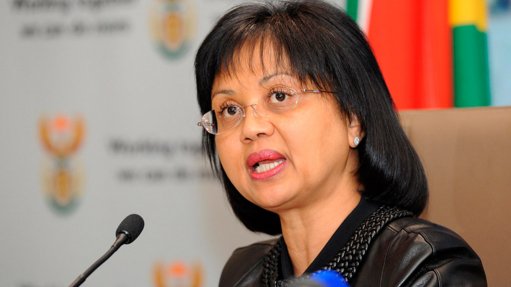
Energy Minister Tina Joemat-Pettersson
The South African Department of Energy (DoE) plans to extend its renewable-energy programme to the rest of Africa over the next five years.
Energy Minister Tina Joemat-Pettersson told the South African International Renewable Energy Conference (Sairec) in Cape Town on Monday that government and Independent Power Producers (IPPs) had made great strides in rolling out renewable-energy projects in South Africa in five short years.
She advised delegates that South Africa hoped to roll out the renewable-energy programme in the rest of Africa, using the expertise it had gleaned over the last few years.
She said South Africa had previously wanted to launch its IPP programme as one focused on Africa, with the Minister noting that the current model would conclude at the end of October. “[The] reshaping of the office has started in earnest and there will be a larger, African mandate for that office.”
Joemat-Pettersson told the opening plenary of the conference that Africa had pledged itself to tripling the capacity of renewable energy and bringing modern, sustainable energy to an additional 100-million households in Africa.
“We want to double the use of natural gas in Africa. We will also double the exports of natural gas in Africa to the rest of the world. We will develop 5 000 MW of all forms of solar energy capacity and, working with the Democratic Republic of Congo, will achieve 10 000 MW of new hydropower facilities before 2030.”
In sub-Saharan Africa, 290-million out of 950-million people did not have access to electricity.
Joemat-Pettersson said the South African government would finalise its energy master plan with inputs from the Sairec conference.
“Our hope is that when we decide on our energy mix, renewable energy will represent the largest percentage of energy source in our mix.”
Joemat-Pettersson promised that there would be ‘more and more opportunities’ in renewable energy. “We will guarantee investment is done in an open and transparent manner. We will protect the integrity of our procurement process. We will fight against all forms of corruption in any way in the renewable-energy process.”
During a media briefing at Sairec, the Minister would not be drawn on government’s plans on nuclear energy, except to say that as a developing country, South Africa had decided on an ‘energy mix’.
“We cannot compare ourselves all the time to developed countries, so our energy mix will be consolidated in our integrated resource plan.”
During the opening plenary, German Ambassador to South Africa Walter Lindner stated to much applause that Germany had decided to drop nuclear completely from its energy plan moving forward. Germany planned to boost its share of renewables from its current 30% to 80%.
The DoE also announced an additional 1 500 MW of solar energy has been allocated for a solar park in the Northern Cape.
Joemat-Pettersson noted that the Northern Cape solar farm project was an additional ‘legacy project’ to mark the conference.
She did not disclose details, but said the Central Energy Fund had been working on the project for more than a year, with involvement from the private sector.
Sairec 2015, the sixth in a series of international renewable energy conferences and the first to be hosted in an African country, drew 3 600 delegates from 82 countries.